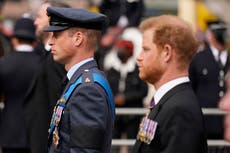Prince Harry says experimental drugs helped him clear ‘the misery of loss’ after Diana’s death
Your support helps us to tell the story
From reproductive rights to climate change to Big Tech, The Independent is on the ground when the story is developing. Whether it's investigating the financials of Elon Musk's pro-Trump PAC or producing our latest documentary, 'The A Word', which shines a light on the American women fighting for reproductive rights, we know how important it is to parse out the facts from the messaging.
At such a critical moment in US history, we need reporters on the ground. Your donation allows us to keep sending journalists to speak to both sides of the story.
The Independent is trusted by Americans across the entire political spectrum. And unlike many other quality news outlets, we choose not to lock Americans out of our reporting and analysis with paywalls. We believe quality journalism should be available to everyone, paid for by those who can afford it.
Your support makes all the difference.Prince Harry has opened up about his ongoing grief over the death of his mother, Princess Diana, and the ways he processed his emotions.
The Duke of Sussex spoke candidly about his mother’s passing during his 60 Minutes interview with Anderson Cooper on Sunday 8 January, ahead of the release of his tell-all memoir Spare on Tuesday 10 January.
During the conversation, the duke revealed that he cried only once after his mother’s death - when his mother’s coffin “actually went into the ground,” and that he later turned to experimental drugs to help him deal with his emotions.
“That was the first time that I actually cried. Yeah, there was never another time,” he said.
His inability to cry bothered him, according to Prince Harry, who told Cooper of the lengths he went to to be able to tap into his grief after his mother’s death in August 1997, when he was just 12 years old.
According to Prince Harry, he watched videos of the late Princess of Wales online in the hopes that they would make him cry.
“There was this weight on my chest that I felt for so many years that I was never able to cry. So I was constantly trying to find a way to cry, but, in even sitting on my sofa and going over as many memories as I could muster up about my mum. And sometimes I watched videos online,” he recalled.
Prince Harry told Cooper that he also turned to alcohol to cope, and later, to therapy and experimental drugs, such as “psychedelics, Ayahuasca, psilocybin, mushrooms”.
According to Harry, the drugs helped him come to terms with his grief, and with his inability to cry.
He said: “I would never recommend people to do this recreationally. But doing it with the right people if you are suffering from a huge amount of loss, grief or trauma, then these things have a way of working as a medicine.
“For me, they cleared the windscreen, the windshield, the misery of loss. They cleared away this idea that I had in my head that I needed to cry to prove to my mother that I missed her. When in fact, all she wanted was for me to be happy.”
Elsewhere in the interview, Prince Harry opened up about his and his brother Prince William’s disbelief in their mother’s death, with the duke revealing that, for “many years,” he and the Prince of Wales “refused to accept that she was gone,” and believed that she was simply hiding somewhere.
“For a long time, I just refused to accept that she was gone. Um, part of, you know, she would never do this to us, but also part of, maybe this is all part of a plan,” Harry told Cooper, adding that he assumed his mother had disappeared for a time and would “that she would call us and that we would go and join her”.
He continued: “William and I talked about it as well. He had similar thoughts.”
When Harry was 20, he asked to see the police report on the car crash that killed his mother. He told Cooper that he wanted to see the police report, and the photographs, as “proof” that his mother was gone.
“Mainly proof. Proof that she was in the car. Proof that she was injured. And proof that the very paparazzi that chased her into the tunnel were the ones that were taking photographs-- photographs of her lying half dead on the back seat of the car,” he said.
Despite the proof, Harry told Cooper that it wasn’t until he was 23 and returned to the Paris tunnel where his mother had died in a car crash, that he fully believed she had died.




Join our commenting forum
Join thought-provoking conversations, follow other Independent readers and see their replies
Comments